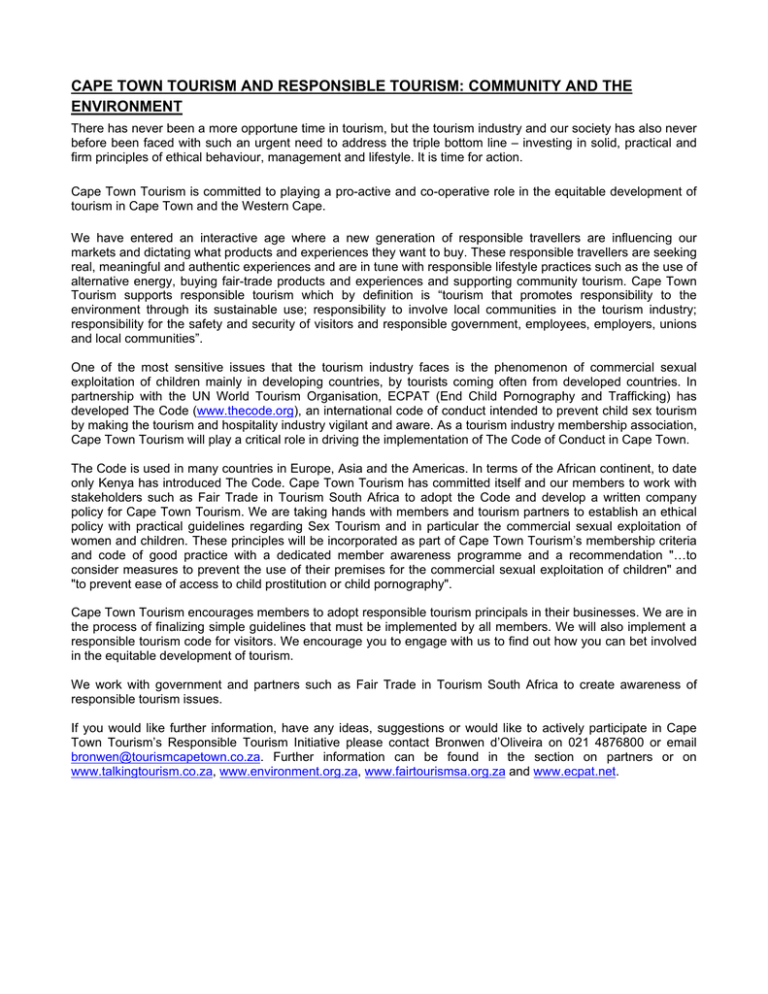
CAPE TOWN TOURISM AND RESPONSIBLE TOURISM: COMMUNITY AND THE
ENVIRONMENT
There has never been a more opportune time in tourism, but the tourism industry and our society has also never
before been faced with such an urgent need to address the triple bottom line – investing in solid, practical and
firm principles of ethical behaviour, management and lifestyle. It is time for action.
Cape Town Tourism is committed to playing a pro-active and co-operative role in the equitable development of
tourism in Cape Town and the Western Cape.
We have entered an interactive age where a new generation of responsible travellers are influencing our
markets and dictating what products and experiences they want to buy. These responsible travellers are seeking
real, meaningful and authentic experiences and are in tune with responsible lifestyle practices such as the use of
alternative energy, buying fair-trade products and experiences and supporting community tourism. Cape Town
Tourism supports responsible tourism which by definition is “tourism that promotes responsibility to the
environment through its sustainable use; responsibility to involve local communities in the tourism industry;
responsibility for the safety and security of visitors and responsible government, employees, employers, unions
and local communities”.
One of the most sensitive issues that the tourism industry faces is the phenomenon of commercial sexual
exploitation of children mainly in developing countries, by tourists coming often from developed countries. In
partnership with the UN World Tourism Organisation, ECPAT (End Child Pornography and Trafficking) has
developed The Code (www.thecode.org), an international code of conduct intended to prevent child sex tourism
by making the tourism and hospitality industry vigilant and aware. As a tourism industry membership association,
Cape Town Tourism will play a critical role in driving the implementation of The Code of Conduct in Cape Town.
The Code is used in many countries in Europe, Asia and the Americas. In terms of the African continent, to date
only Kenya has introduced The Code. Cape Town Tourism has committed itself and our members to work with
stakeholders such as Fair Trade in Tourism South Africa to adopt the Code and develop a written company
policy for Cape Town Tourism. We are taking hands with members and tourism partners to establish an ethical
policy with practical guidelines regarding Sex Tourism and in particular the commercial sexual exploitation of
women and children. These principles will be incorporated as part of Cape Town Tourism’s membership criteria
and code of good practice with a dedicated member awareness programme and a recommendation "…to
consider measures to prevent the use of their premises for the commercial sexual exploitation of children" and
"to prevent ease of access to child prostitution or child pornography".
Cape Town Tourism encourages members to adopt responsible tourism principals in their businesses. We are in
the process of finalizing simple guidelines that must be implemented by all members. We will also implement a
responsible tourism code for visitors. We encourage you to engage with us to find out how you can bet involved
in the equitable development of tourism.
We work with government and partners such as Fair Trade in Tourism South Africa to create awareness of
responsible tourism issues.
If you would like further information, have any ideas, suggestions or would like to actively participate in Cape
Town Tourism’s Responsible Tourism Initiative please contact Bronwen d’Oliveira on 021 4876800 or email
bronwen@tourismcapetown.co.za. Further information can be found in the section on partners or on
www.talkingtourism.co.za, www.environment.org.za, www.fairtourismsa.org.za and www.ecpat.net.
Quality assurance of establishments
Cape Town Tourism, along with all other Local Tourism Organizations across the province, has been committed
to a provincial quality assurance programme since our inception in 2004. Only products that agree to our code of
conduct and fulfil the minimum standards criteria required for their category of membership are promoted by
Cape Town Tourism to ensure a quality visitor experience.
The quality assurance programme is operated in partnership with the star grading system managed by the
Tourism Grading Council of South Africa (TGCSA). The assessment is conducted by qualified grading council
assessors. The cost of the assessment is included in the membership fees. Assessments are conducted every
two years.
Aassessment applies to all accommodation providers that are not graded and all tour operators that have not
passed the SATSA minimum criteria. We are working with the province to expand these criteria to other
categories including conference venues and restaurants. We are also working to include the following draft
responsible tourism criteria:
•
•
•
Evidence of a environmental statement and/or policy
Evidence of a supply chain or procurement statement and/or policy including commitment to buy from
local businesses
Evidence of a community interaction statement and/or policy including a commitment to use local guides
and assist guests in community engagement.




